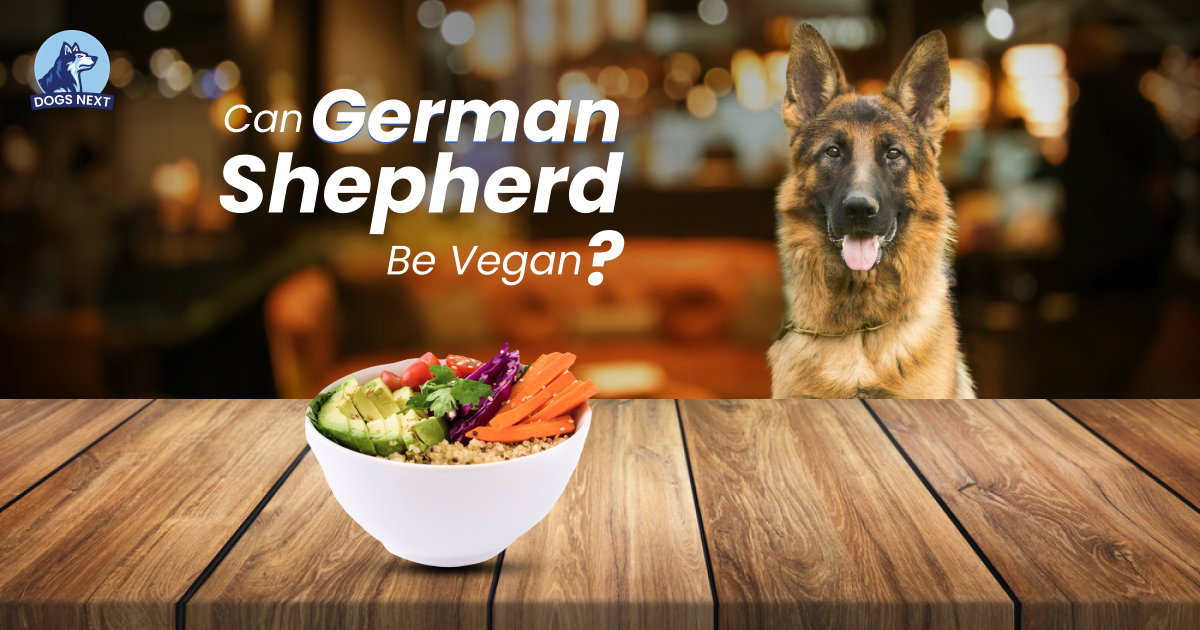German Shepherds are a highly active and muscular breed that require a high-protein diet to maintain optimal health. As the popularity of vegetarian and vegan diets grows, some pet owners may wonder whether their German Shepherd can thrive on a meatless diet.
While dogs are omnivores and can survive on a plant-based diet, the question remains whether a vegetarian diet can provide all the necessary nutrients for a German Shepherd’s well-being.
In this article, we will explore the topic of whether German Shepherds can be vegetarian. We will delve into the nutritional needs of German Shepherds, the challenges of feeding them a vegetarian diet, and the potential benefits and drawbacks of a meatless diet for your furry friend.
Table of Contents
Can German Shepherds Survive on a Vegetarian (plant-based foods) Diet
German Shepherds may be able to survive on a vegetarian diet, but it is not recommended as it may lead to serious health problems. German Shepherds require a high amount of protein in their diet, and plant-based sources may not provide all the essential amino acids that are needed for optimal health.
A vegetarian diet may also lead to nutrient deficiencies, digestive problems, and behavioral changes in German Shepherds. While vegetarian diets for German Shepherds are possible, it is important to ensure that they receive all the essential nutrients that their bodies require through supplementation and consultation with a veterinarian.
The Nutritional Needs of German Shepherds
German Shepherds are a large and active breed that requires a balanced and protein-rich diet to maintain their health and energy levels. Here, we will discuss the specific nutritional needs of German Shepherds and how they differ from other breeds.
Protein Requirements
German Shepherds require a higher amount of protein compared to other breeds. The protein content of their diet should be around 22-24% to support muscle growth, tissue repair, and overall health.
Essential Amino Acids
German Shepherds require all essential amino acids, which are the building blocks of protein. The body cannot synthesize these amino acids and must be obtained through food. Meat, poultry, fish, and eggs are excellent sources of essential amino acids for pet foods.
Fat Content
German Shepherds need moderate fat in their diet to provide energy and support their skin and coat health. The ideal fat content is around 12-16%.
Carbohydrates and Fiber
German Shepherds require moderate carbohydrates in their diet to provide energy. Fiber is also essential for digestive health and can help prevent gastrointestinal problems.
Micronutrients
German Shepherds require a range of micronutrients, including vitamins, minerals, and antioxidants, to maintain optimal health. These can be obtained through a balanced raw diet and varied diet that includes fruits, vegetables, and supplements if needed.
Are German Shepherds Suited To A Vegan Diet
Here, we will explore the challenges and potential risks of feeding a German Shepherd vegan dog food or a vegan diet.
Protein Requirements
As previously mentioned, German Shepherds require a high amount of protein in their diet, and vegan sources of protein may not provide all the essential amino acids that are needed for optimal health. While some plant-based protein sources, such as soybeans and quinoa, are complete proteins, they may not be enough to meet a German Shepherd’s needs.
Nutrient Deficiencies
A vegan diet may lead to nutrient deficiencies in German Shepherds. Some essential micronutrients, such as vitamin B12, are only found in animal products. Deficiencies in B12 and other essential nutrients can lead to serious health problems, such as anemia and neurological disorders.
Digestive Problems
German Shepherds may experience digestive problems when switching to a vegan diet, especially if the transition is sudden. Their digestive system is adapted to digesting animal-based proteins, and plant-based proteins may be more difficult to digest, leading to digestive issues such as bloating, gas, and diarrhea.
Behavioral Changes
Some pet owners report that their German Shepherds become lethargic and have a decreased appetite when switched to a vegan diet. This may be due to the lack of essential nutrients and proteins that their bodies require.
What Would be the Vegetarian (Meat-free diets) Diets for German Shepherds
While it is not recommended for German Shepherds to be on a vegan diet, some vegetarian options may be suitable for those who wish to avoid feeding their dogs meat:
- Plant-based Protein Sources
Vegetarian diets for German Shepherds should include high-quality plant-based protein sources such as soybeans, lentils, chickpeas, and quinoa. It is important to note that these plant-based protein sources may not provide all of the essential amino acids that German Shepherds require, so it is important to supplement their diet with additional amino acids.
- Dairy Products
Dairy products such as cottage cheese, yogurt, and cheese can be included in a vegetarian diet for German Shepherds as a source of protein, calcium, and other essential nutrients. However, it is important to note that some dogs may be lactose intolerant and may experience digestive problems when consuming dairy products.
- Eggs
Eggs are a good source of protein and can be included in a vegetarian diet for German Shepherds. They also provide essential nutrients such as vitamin D and choline.
- Vegetables and Fruits
Vegetables and fruits are an important part of any diet, and they can provide essential vitamins and minerals to German Shepherds on a vegetarian diet. Some vegetables that are particularly beneficial for dogs include spinach, broccoli, and sweet potatoes.
- Supplements
To ensure that German Shepherds on a vegetarian diet receive all the necessary nutrients, it may be necessary to provide additional supplements such as omega-3 fatty acids, vitamin B12, and iron.
Pros and Cons of Vegetarian Diets for German Shepherds
Certainly, here is an outline of the pros and cons of vegetarian diets for German Shepherds:
Pros:
Environmental Impact
A vegetarian diet for German Shepherds has a smaller environmental impact than a meat-based diet. This can be beneficial for those who wish to reduce their carbon footprint.
Avoidance of Animal Cruelty
Some individuals may choose to feed their German Shepherds a vegetarian diet to avoid contributing to animal cruelty in the meat industry.
Potential Health Benefits
A well-planned vegetarian diet for German Shepherds can provide them with essential nutrients and may have potential health benefits, such as reducing the risk of certain diseases.
Cons:
Nutritional Deficiencies
German Shepherds require high levels of protein in their diet, and vegetarian diets may not provide all of the essential amino acids that are required for optimal health. This can lead to nutritional deficiencies, including deficiencies in vitamins and minerals.
Digestive Problems
Some German Shepherds may experience digestive problems when transitioning to a vegetarian diet, such as diarrhea, vomiting, and gas.
Behavioral Changes
German Shepherds on a vegetarian diet may experience behavioral changes, such as decreased energy levels and a lack of interest in food.
Difficulty Meeting Nutritional Needs
It can be difficult to ensure that a vegetarian diet provides all of the essential nutrients that German Shepherds require, and supplementation may be necessary.
A Guide to Vegetarian and Vegan Diets for Dogs
| Vegan Diets for Dogs | Details |
| Can German Shepherds be Vegetarian? | German Shepherds can be vegetarian or vegan, but it is important to ensure that their diet is properly balanced and includes all necessary nutrients. Consult with a veterinarian before making any significant changes to your dog’s diet. |
| Vegetarian Diet for Dogs | A vegetarian diet for dogs can be nutritionally complete if it includes high-quality sources of protein, such as eggs or dairy products, and balanced amounts of carbohydrates and fats. Dogs require specific nutrients, such as taurine and vitamin D, which may be lacking in a vegetarian diet. |
| Vegan Diet for Dogs | A vegan diet for dogs may be more challenging to balance properly, as it excludes all animal products. It is important to work closely with a veterinarian or veterinary nutritionist to ensure that your dog’s diet meets all of their nutritional needs. |
What to Think About Before Switching Your German Shepard to a Vegan Diet
Before making any dietary changes for your dog, consider several important considerations and points.
The Nutritional Needs of German Shepherds
German Shepherds require specific nutrients for optimal health and well-being, including protein, fat, calcium, and vitamin D. These nutrients are most commonly found in animal-based products such as meat, eggs, and dairy.
While it is possible to meet a dog’s nutritional needs on a vegan diet, it requires careful planning and monitoring. It is essential to ensure that the dog’s diet contains enough protein, healthy fats, and essential vitamins and minerals to support their growth, energy, and overall health.
Potential Health Risks
Feeding a German Shepherd a vegan diet may pose potential health risks, including malnutrition, digestive issues, and other health complications. For example, a lack of taurine, an essential amino acid found in animal-based products, can lead to heart disease and blindness in dogs.
Similarly, an imbalance of omega-3 and omega-6 fatty acids can cause skin and coat issues, as well as inflammation and other health problems. These risks can be mitigated by careful planning and monitoring of the dog’s diet, but it is essential to understand the potential health implications before making any dietary changes.
Ethical Considerations
Some pet owners may choose to switch their German Shepherd to a vegan diet for ethical or environmental reasons, such as concerns about animal welfare, sustainability, or climate change. While these are important considerations, it is crucial to prioritize the dog’s nutritional needs and well-being above all else.
Feeding a dog, a diet that may not meet its nutritional needs can lead to serious health complications and is not in its best interests. It is possible to make ethical and sustainable choices while still meeting a dog’s nutritional needs, such as choosing high-quality, humanely-raised animal-based products.
Consultation with a Veterinarian
Before making any dietary changes for a German Shepherd, it is crucial to consult with a veterinarian. A veterinarian can provide guidance on meeting the dog’s nutritional needs, monitor their health and well-being, and identify any potential health issues.
Pet owners should ask their veterinarian about the essential nutrients that their dog requires, what foods they can feed their dog to meet those needs, and how often they should bring their dog in for check-ups.
Frequently Asked Questions
Q: Can dogs survive on a vegetarian diet?
Ans: While it is possible for dogs to survive on a vegetarian diet, it requires careful planning and monitoring to ensure that they receive all the essential nutrients they need for optimal health.
Q: Do German Shepherds need meat?
Ans: German Shepherds require specific nutrients, such as protein, fat, calcium, and vitamin D, that are most commonly found in animal-based products like meat, eggs, and dairy. While it is possible to meet their nutritional needs on a vegetarian or vegan diet, it requires careful planning and monitoring.
Q: What is the best vegetarian diet for German Shepherds?
Ans: The best vegetarian diet for German Shepherds is one that meets all of their nutritional needs through careful planning and monitoring. This may include high-quality plant-based sources of protein, healthy fats, and essential vitamins and minerals.
Q: Can German Shepherds eat onions?
Ans: No, onions are toxic to dogs and can cause serious health complications such as anemia.
Q: Can German Shepherds eat tomatoes?
Ans: Yes, tomatoes are safe for German Shepherds to eat in moderation. However, the leaves and stems of the tomato plant are toxic and should be avoided.
Q: Can German Shepherds eat corn on the cob?
Ans: No, dogs should not eat corn on the cob as it can cause digestive issues and potentially lead to intestinal blockages.
Q: Can German Shepherds eat asparagus?
Ans: Yes, asparagus is safe for German Shepherds to eat in moderation. It can be a healthy addition to their diet, providing essential vitamins and nutrients.
Conclusion
While a vegetarian diet for German Shepherds may have some potential benefits, it also comes with significant risks and drawbacks. Nutritional deficiencies, digestive problems, behavioral changes, and the difficulty of meeting nutritional needs are all valid concerns that must be taken into consideration before deciding on a vegetarian diet for a German Shepherd.
It is crucial to consult with a veterinarian to ensure that the dog’s dietary needs are met and to monitor their health closely during the transition period.
Ultimately, the decision to feed a German Shepherd a vegetarian diet should be based on careful consideration of all factors and the dog’s individual needs.

I’m David, an expert contributor and writer, with two furry friends of my own, I know the challenges of raising and caring for dogs. From training to nutrition and health, my goal is to provide valuable insights and advice to help create strong bonds and happy, healthy lives. Find me in Twitter.




